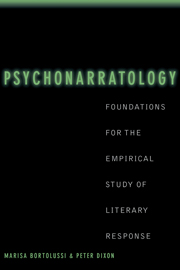Book contents
3 - The Narrator
Published online by Cambridge University Press: 28 July 2009
Summary
In literary studies, it is commonly assumed that the presence of a narrator is one of the features distinguishing fiction from nonfiction (Makaryk, 1993). In natural narratives and nonfictional discourse, the argument goes, the speaker of the utterance speaks directly in his or her own voice, whereas in fictional narratives the utterance is delivered by the mediating voice of a narrator, an entity distinct from the historical author. Although the nature of this distinction and the relationship between author and narrator are matters of debate, virtually all agree on the distinction's importance. Indeed, it is conceivable that even in natural narratives and nonfictional discourse, storytellers or conversational participants may “project” themselves into a speaking function distinct from themselves. But certainly in the case of fictional narratives, the story and all the details pertaining to the story world – characters, events, situations, setting, and so on – are mediated by the voice of a narrator. Inevitably, this mediation affects the reader's responses to the fictional world. The most immediate implication of this fact of narrative is that readers must create a representation of the narrator, that is, a representation of the person who seems to utter the words of the text. Further, in our approach, the reader may represent the narrator as if the reader and the narrator were participating in a communicative situation. The presence, in the mind of the reader, of this communicative situation colors virtually all aspects of the text and its interpretation.
- Type
- Chapter
- Information
- PsychonarratologyFoundations for the Empirical Study of Literary Response, pp. 60 - 96Publisher: Cambridge University PressPrint publication year: 2002



